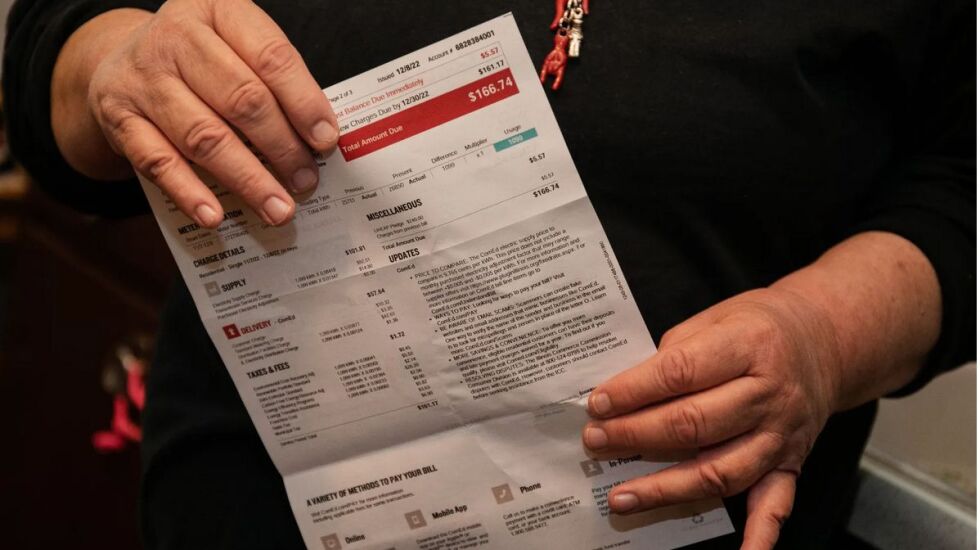
What happens in the next 11 months will have a lot to do with how much more money consumers will pay to utility companies. The Illinois Commerce Commission will need to work overtime to ensure the bills are fair.
Last Tuesday, ComEd submitted a request for a record-high rate increase, following the timing for making rate increase requests set in the 2021 Climate and Equitable Jobs Act. But four other utilities — Peoples Gas, Ameren, Nicor and North Shore Gas — also have submitted requests for delivery rate increases. That’s a lot of work to dump on regulators’ laps all at once, to make sure consumers don’t take too much hit to their wallets.
ComEd is asking for a $1.47 billion increase phased in over four years, Peoples Gas wants $402 million, Nicor is seeking $321 million, North Shore Gas wants $18.5 million, and the downstate utility Ameren, which provides both natural gas and electricity, on Thursday put in for a $160 million increase for its gas delivery and an additional phased-in multi-year increase for providing electricity. Peoples’ and Nicor’s requests also are all-time highs.
That adds up to a big chunk of change, and all those concurrent rate hike requests threaten to overwhelm the ability of the Illinois Commerce Commission and consumer groups to thoroughly vet the highly technical documents the utilities are submitting. Staff members at the ICC, the Citizens Utility Board and other agencies will have their work cut out for them figuring out which parts of these rate increases are wise to move Illinois’ energy delivery systems into the future — and which parts will unnecessarily drive up costs.
“Preposterous”
Consumer advocates are calling the surge of rate increase requests all at the same time “preposterous,” “not an accident,” ”an attempt to overrun the system” and “a strategy [utilities] have used in other states to overwhelm the regulators and the consumer advocates.” The rate increases must be decided by December, which may sound like a lot of time, but it really isn’t. The hours needed to examine all of the requests in depth are really off the charts.
In one sense, this is a step forward for Illinois. A decade or so ago, the Legislature largely replaced the ICC’s ability to oversee utility rates with so-called formula rates and other measures that allowed utilities to skirt traditional rate reviews. Critics say those systems drove up consumer costs unnecessarily.
Returning to a system in which utilities must make their case for rate increases before the ICC is the right move. But the ICC and others need time to do the job right.
The ICC, which was already assigned more work under CEJA, needs more staff members, but we’re told it’s hard to hire people because salaries aren’t commensurate with what individuals with the right technical skills can get in private industry. Still, the ICC must do whatever is necessary, all it can, to ensure it has the staff to do the job.
The $1.47 billion ComEd is asking for has been criticized as an irresponsible request that includes an exorbitant profit rate of 10.5%, a lot of money at a time when many consumers are hurting. But both the utilities and consumer advocates know that is an opening bid that is likely to be lowered.
Each of the utilities has different challenges. Natural gas companies are operating at a time when there is a strong shift away from burning fossil fuels. For example, Mayor Lori Lightfoot reportedly is planning to propose requiring new buildings to use electricity instead of natural gas. In coming decades, the gas utilities could be left with a “stranded asset” — huge networks of pipelines used by fewer and fewer customers.
ComEd, meanwhile, must grapple with an expected surge in demand for electricity as electric vehicles replace those powered by internal combustion, and more homes and businesses transition to electricity. ComEd also must adjust its distribution system to cope with electricity coming from increasingly popular rooftop solar installations and prepare for increasingly severe weather events caused by climate change.
The ICC faces a big job in getting its rate review process right. But failure to do so is not an option.
The Sun-Times welcomes letters to the editor and op-eds. See our guidelines.







